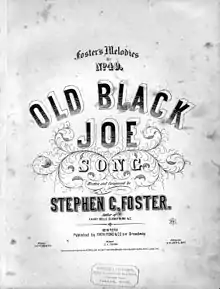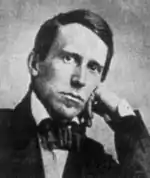Old Black Joe
"Old Black Joe" is a parlor song by Stephen Foster (1826–1864). It was published by Firth, Pond & Co. of New York in 1860.[1] Ken Emerson, author of the book Doo-Dah! (1998), indicates that Foster's fictional Joe was inspired by a servant in the home of Foster's father-in-law, Dr. McDowell of Pittsburgh. The song is not written in dialect.
| "Old Black Joe" | |
|---|---|
 Original sheet music cover | |
| Song | |
| Published | 1860 |
| Songwriter(s) | Stephen Foster |
Emerson believes that the song's "soft melancholy" and its "elusive undertone" (rather than anything musical), brings the song closest to the traditional African-American spiritual.[2]
Harold Vincent Milligan describes the song as "one of the best of the Ethiopian songs ... its mood is one of gentle melancholy, of sorrow without bitterness. There is a wistful tenderness in the music."[3] Jim Kweskin covered the song on his 1971 album Jim Kweskin's America.[4]
The song has sometimes been recorded as "Old, Old Joe", including by Paul Robeson. Other notable recordings were by Bing Crosby (recorded June 16, 1941),[5] Jerry Lee Lewis (1959) and Al Jolson (recorded July 13, 1950).[6]
Lyrics
1.
Gone are the days when my heart was young and gay,
Gone are my friends from the cotton fields away,
Gone from the earth to a better land I know,
I hear their gentle voices calling "Old Black Joe".
Chorus
I'm coming, I'm coming, for my head is bending low;
I hear those gentle voices calling, "Old Black Joe".
2.
Why do I weep when my heart should feel no pain?
Why do I sigh that my friends come not again,
Grieving for forms now departed long ago?
I hear their gentle voices calling "Old Black Joe".
Chorus
3.
Where are the hearts once so happy and so free?
The children so dear that I held upon my knee,
Gone to the shore where my soul has longed to go.
I hear their gentle voices calling "Old Black Joe".
Chorus
Adaptations
- Thomas Dixon, Jr.'s one-act play Old Black Joe was produced in New York in 1912.[7]{:69
- Roy Harris made a choral adaptation of the song: Old Black Joe, A Free Paraphrase for full chorus of mixed voices a capella (1938).
- In July 1926, Fleischer Studios released a short cartoon of the song in the Song Car-Tunes series, made in the DeForest Phonofilm sound-on-film process.[8]
- The first line of the Chorus lyrics is sung by Bugs Bunny in the 1953 Looney Tunes cartoon "Southern Fried Rabbit".
- In a 1973 episode of the TV sitcom Maude the character of Walter Findlay repeatedly plays the song on an electric organ.
- In a 2000 episode of the TV sitcom Strangers with Candy a student sings and plays acoustic guitar. Season 2, Episode 6, "Hit and Run".
- In the 1991 Palme d'Or winner Barton Fink, the character of W. P. Mayhew drunkenly performs Fosters song.
References
- "Old Black Joe". Retrieved September 5, 2011.
- Ken Emerson. 1998. Doo-dah!: Stephen Foster and the rise of American popular culture Da Capo Press. pp. 256-9.
- Harold Vincent Milligan. 1920. Stephen Collins Foster: a biography of America's folk-song composer. p. 87.
- Lundborg, Patrick (2004). "Woody Guthrie on Acid". Ugly Things (22): 114–117. Retrieved July 10, 2011.
- "A Bing Crosby Discography". BING magazine. International Club Crosby. Retrieved August 5, 2017.
- "jolson.org". jolson.org. Retrieved August 5, 2017.
- Slide, Anthony (2004). American Racist: The Life and Films of Thomas Dixon. Lexington, Kentucky: University Press of Kentucky. ISBN 0-8131-2328-3.
- SilentEra entry
External links
- Sheet music
- "Old Black Joe" search at the Library of Congress' National Jukebox
- "Old Black Joe" search at the Internet Archive
- "Old Black Joe" sung by Collins & Harlan at the Alexandria Digital Research Library
